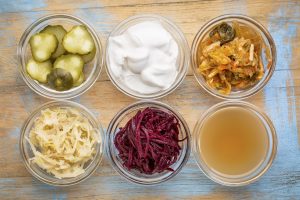
Fermented foods can provide natural sources of good bacteria.
From hearing your stomach grumble when it’s hungry to the gurgling sounds of indigestion, the gut reminds us everyday of its important presence in our health. Gut bacteria are vital to keeping balance in the body. Also, gut bacteria make sure that any food consumed is being used for energy. However, recent research has shown that gut bacteria may also be crucial for positive health outcomes after injury.
What is gut bacteria?
Gut bacteria is part of a community of microorganisms such as fungi and viruses that live in the gut microbiome. Also, gut bacteria get along well with the cells of the gastrointestinal (GI) tract and are not known for causing disease. Functions of gut bacteria include:
- breaking down nutrients to be used for energy
- protecting the body from toxic invaders
- breaking down and eliminating drugs from the body
Imbalances of gut bacteria in the body can lead to conditions such as inflammatory bowel disease (IBD). Also, gut bacteria live in harmony with the immune system and work together to keep the body safe from “bad” bacteria. However, an imbalance in “good” versus “bad” bacteria in the gut could have an impact on immune system function.
Gut bacteria and Injury
A study of 12 critically injured adults in the journal Trauma Surgery & Acute Care Open looked at the status of gut bacteria health over time. Stool samples were taken 24 hours and 72 hours after admission to the hospital. After 72 hours, three types of bacteria had been depleted in the injured group, while two types of bacteria had risen. More studies need to be done to explore this finding more. However, the researchers suggest that gut bacteria structure could affect patient outcomes after traumatic injury. Furthermore, probiotics may be one future treatment to help improve patient outcomes in these cases.
What are probiotics?
Probiotics, which means “for life,” are live microorganisms meant to have positive health benefits. You may see on store shelves many probiotic medicines containing bacteria from the groups Lactobacillus and Bifidobacterium. However, since each strain of bacteria benefits a different function in the gut, the more types of strains in a probiotic, the potentially greater health impact. Probiotics may be helpful in preventing diarrhea caused by infections and antibiotics as well as in treatment of those with irritable bowel syndrome (IBS). Basic functions of probiotics may include:
- maintaining a diverse community of microorganisms
- maintain a protective barrier for the gut to keep out pathogens
- recover balance after infection, antibiotic treatment, or other disturbances
- Stop growth of and fight off unwanted microorganisms
- Nourish and strengthen the immune system
Biovia30 by VitaSciences provides 30 million colony forming units per dose of diverse strains to help restore balance in the gut and promote immune system strength. Furthermore, Biovia30 contains various strains of Bacillus, Lactobacillus, and Bifidobacterium to help you build up “good” bacteria stores and keep “bad” bacteria out.
Other ways to protect the gut
- Eat plenty of fruits, vegetables, and other fiber-rich foods to help promote diversity of gut bacteria.
- Stop smoking or don’t start since smoking can negatively affect gut bacteria and the immune system. Not only does smoking constrict blood vessels, but it also causes inflammation in the body which can cause cell damage.
- Find healthy ways to manage stress such as yoga, meditation, or exercise since stress can alter gut bacteria populations. Stress is one of the contributing factors of IBS.
- Lower saturated fat intake to help lower numbers of inflammatory microbes in the gut.
- Consume phytonutrients such as polyphenols and tannins found in colorful berries, beans, nuts, seeds, and teas. These compounds can nourish microbes in the digestive tract.
Probiotics shown great promise for helping to treat various health conditions. However, potential benefits of probiotics must be confirmed by further research. Please contact your healthcare provider before starting any new supplement regimen.
Sources:
Conlon, M. A., & Bird, A. R. (2015). The Impact of Diet and Lifestyle on Gut Microbiota and Human Health. Nutrients, 7(1), 17–44. http://doi.org/10.3390/nu7010017
Jandhyala, S. M., Talukdar, R., Subramanyam, C., Vuyyuru, H., Sasikala, M., & Reddy, D. N. (2015). Role of the normal gut microbiota. World Journal of Gastroenterology : WJG, 21(29), 8787–8803. http://doi.org/10.3748/wjg.v21.i29.8787
Medline Plus (October 26, 2017) “Gut Bacteria May Change Rapidly After Severe Injury.”
National Center for Complementary and Integrative Health (October 2016) “Probiotics: In Depth”